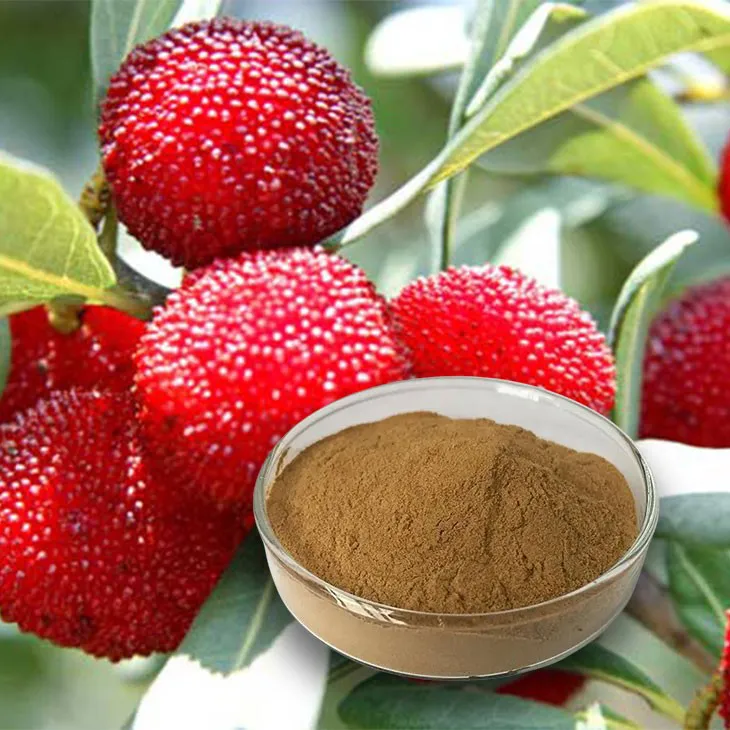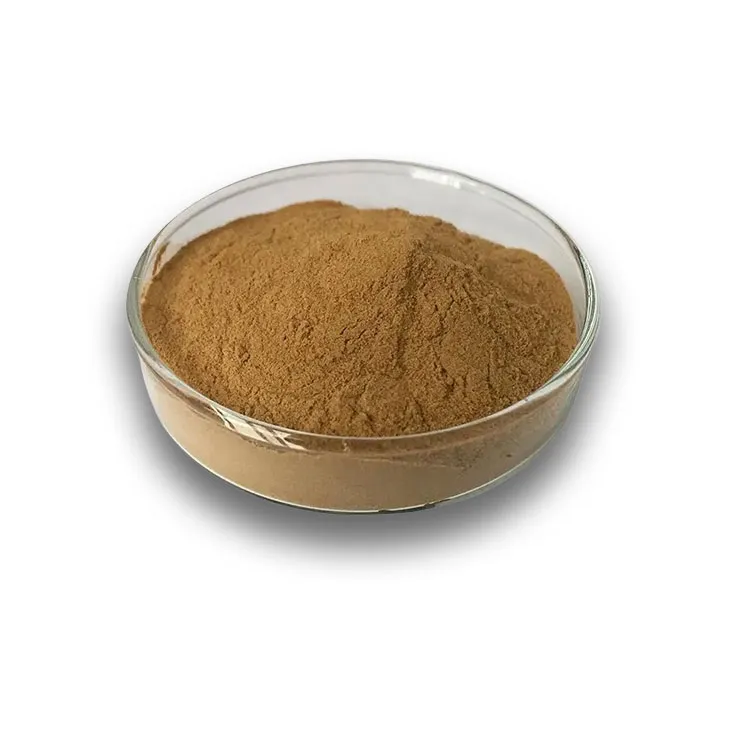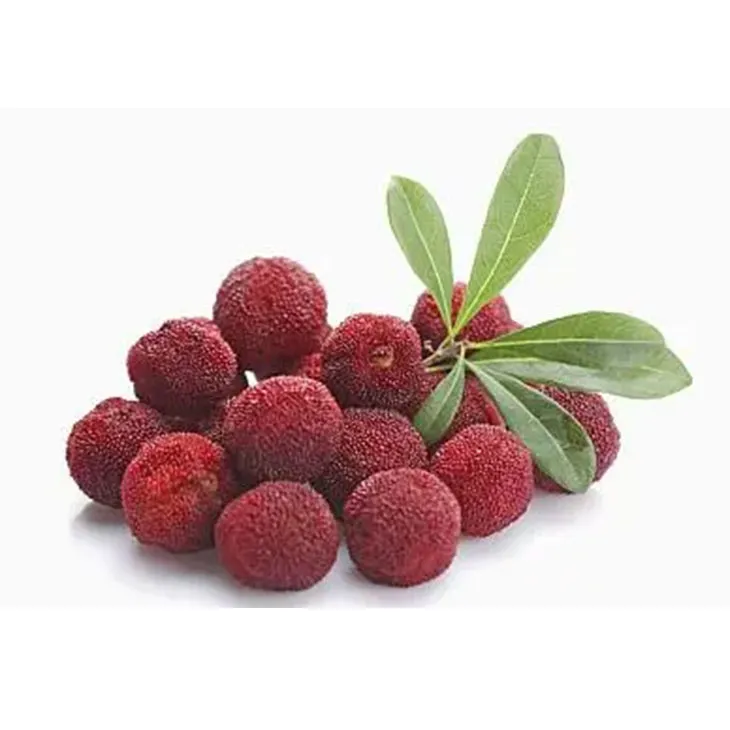- 0086-571-85302990
- sales@greenskybio.com
The Optimal Bioavailability of Bayberry Extracts.
2024-12-02

1. Introduction
Bayberry, a fruit with rich nutritional and medicinal values, has attracted increasing attention in recent years. Bayberry Extract contains a variety of bioactive compounds such as flavonoids, phenolic acids, and tannins. However, the bioavailability of these beneficial compounds in Bayberry Extract is a crucial factor determining their efficacy in the human body. Bioavailability refers to the proportion of a drug or other substance that enters the circulation when introduced into the body and so is able to have an active effect. Understanding and maximizing the bioavailability of Bayberry Extract can help us better utilize its health - promoting properties.

2. Extraction Techniques and Bioavailability
2.1 Conventional Solvent Extraction
Conventional solvent extraction is one of the most commonly used methods for obtaining bayberry extract. Solvents such as ethanol, methanol, and water are often used. Ethanol - based extraction can effectively extract flavonoids and phenolic acids from bayberry. However, the choice of solvent and extraction conditions can significantly affect the bioavailability of the extract. For example, high - temperature extraction may cause degradation of some heat - sensitive bioactive compounds, reducing their bioavailability.
2.2 Supercritical Fluid Extraction
Supercritical fluid extraction (SFE) has emerged as a more advanced extraction technique. Carbon dioxide (CO₂) is often used as the supercritical fluid. SFE has several advantages over conventional solvent extraction. It can operate at relatively low temperatures, which helps to preserve the integrity of bioactive compounds in bayberry. This, in turn, can potentially enhance their bioavailability. Moreover, the extract obtained by SFE is generally purer, with fewer impurities that may interfere with absorption in the body.
2.3 Enzyme - Assisted Extraction
Enzyme - assisted extraction is another innovative method. By using specific enzymes, such as cellulase and pectinase, the cell walls of bayberry can be broken down more effectively. This allows for better release of bioactive compounds. The resulting extract may have improved bioavailability as the compounds are more easily accessible for absorption. For instance, enzymes can break down complex polysaccharides and proteins that may bind to bioactive compounds, liberating them for better absorption.

3. Consumption Forms and Bioavailability
3.1 Oral Consumption
Oral consumption is the most common way of taking bayberry extract. When taken orally, the extract has to pass through the digestive system. In the stomach, the acidic environment can affect the stability of some bioactive compounds. For example, some flavonoids may form complexes with gastric juices, which may either enhance or reduce their bioavailability depending on the nature of the complex. In the intestine, absorption mechanisms play a crucial role. The presence of bile salts and digestive enzymes can also influence the absorption of bayberry extract components.
3.2 Topical Application
For some applications, bayberry extract can be used topically. In this case, the bioavailability is related to the skin penetration ability of the extract. The lipophilicity and molecular size of the bioactive compounds in the extract are important factors. Smaller molecules and more lipophilic compounds are generally more likely to penetrate the skin barrier and reach the target sites in the skin. However, the skin also has its own defense mechanisms, such as the stratum corneum, which can limit the absorption of the extract.

4. Body Absorption Mechanisms
4.1 Passive Diffusion
Passive diffusion is a fundamental absorption mechanism for bayberry extract components. Many small - molecule bioactive compounds, such as phenolic acids, can cross cell membranes through passive diffusion. This process is driven by the concentration gradient across the membrane. The lipid - solubility of the compounds is an important factor in passive diffusion. Compounds with higher lipid - solubility can more easily pass through the lipid bilayer of cell membranes.
4.2 Active Transport
Some bioactive compounds in bayberry extract may be absorbed through active transport. This requires the expenditure of energy and the participation of specific carrier proteins. For example, certain flavonoids may be transported into cells by carrier proteins. Active transport is often selective, meaning that only specific compounds or structurally similar compounds can be transported by a particular carrier protein.
4.3 Endocytosis
Endocytosis is another mechanism involved in the absorption of bayberry extract components. Macromolecular substances or nanoparticles in the extract may be taken up by cells through endocytosis. This process involves the formation of vesicles that engulf the substances and transport them into the cell. Endocytosis can be receptor - mediated or non - receptor - mediated, depending on whether specific receptors on the cell surface are involved.
5. Strategies to Maximize Bioavailability
To maximize the bioavailability of bayberry extract, several strategies can be considered:
- Optimizing extraction techniques: Selecting the most appropriate extraction method, such as supercritical fluid extraction or enzyme - assisted extraction, can help preserve the bioactivity of the compounds and enhance their bioavailability.
- Formulating appropriate consumption forms: For oral consumption, formulating the extract into nano - emulsions or micro - capsules can protect the bioactive compounds from degradation in the digestive system and improve their absorption. For topical application, using penetration enhancers can increase skin penetration.
- Considering combination with other substances: Combining bayberry extract with substances that can enhance absorption, such as certain vitamins or fatty acids, may improve its bioavailability. For example, vitamin C can enhance the absorption of some flavonoids.
6. Conclusion
Maximizing the bioavailability of bayberry extract is a complex but important task. By comprehensively considering extraction techniques, consumption forms, and body absorption mechanisms, we can develop more effective ways to utilize the health - promoting properties of bayberry extract. Future research should continue to explore new extraction methods, better consumption forms, and a deeper understanding of absorption mechanisms to further improve the bioavailability of bayberry extract and its applications in the fields of medicine, nutrition, and cosmetics.
FAQ:
Q1: What are the common extraction techniques for bayberry extract and how do they affect bioavailability?
Common extraction techniques for bayberry extract include solvent extraction, supercritical fluid extraction, etc. Solvent extraction uses solvents like ethanol to dissolve the active compounds in bayberry. However, the choice of solvent and extraction conditions can influence the purity and form of the extracted compounds, which in turn affects bioavailability. Supercritical fluid extraction, often using carbon dioxide, can produce a more pure extract with better-preserved active components, potentially enhancing bioavailability as the components are in a more suitable form for absorption.
Q2: In what forms can bayberry extract be consumed and which form has the highest bioavailability?
Bayberry extract can be consumed in forms such as capsules, tablets, and liquid extracts. Liquid extracts may have relatively higher bioavailability in some cases. This is because liquid forms are more easily digested and absorbed by the body compared to solid forms like capsules or tablets, which need to be broken down further in the digestive system before absorption.
Q3: How does the body absorption mechanism work for bayberry extract?
The absorption of bayberry extract in the body mainly occurs in the digestive tract. The active compounds in the extract are first released from their matrix during digestion. Then, they are absorbed through the intestinal wall into the bloodstream. Some components may be absorbed by passive diffusion, while others may require specific transporters. For example, if there are water - soluble vitamins or phenolic compounds in the bayberry extract, they may use different transport mechanisms depending on their chemical properties.
Q4: Are there any factors in the diet that can influence the bioavailability of bayberry extract?
Yes, there are several factors in the diet. For example, the presence of certain fats can enhance the absorption of fat - soluble components in bayberry extract. On the other hand, high - fiber foods may slow down the absorption process as they can bind to some of the extract components. Also, consuming bayberry extract with certain fruits or vegetables that contain enzymes or co - factors may potentially improve its bioavailability.
Q5: How can the bioavailability of bayberry extract be improved during the extraction process?
During the extraction process, optimizing the extraction parameters can improve bioavailability. This includes using the appropriate solvent, extraction time, and temperature. For example, a shorter extraction time at a lower temperature may help preserve the integrity of the active compounds. Additionally, combining different extraction techniques or using pre - treatment methods on the bayberry raw material, such as drying or grinding, can also have an impact on the bioavailability of the final extract.
Related literature
- Bioavailability of Phytochemicals from Bayberry: A Review"
- "Enhancing the Bioavailability of Bayberry Extract through Advanced Extraction Technologies"
- "The Role of Consumption Forms in the Bioavailability of Bayberry - derived Compounds"
- ▶ Hesperidin
- ▶ Citrus Bioflavonoids
- ▶ Plant Extract
- ▶ lycopene
- ▶ Diosmin
- ▶ Grape seed extract
- ▶ Sea buckthorn Juice Powder
- ▶ Fruit Juice Powder
- ▶ Hops Extract
- ▶ Artichoke Extract
- ▶ Mushroom extract
- ▶ Astaxanthin
- ▶ Green Tea Extract
- ▶ Curcumin
- ▶ Horse Chestnut Extract
- ▶ Other Product
- ▶ Boswellia Serrata Extract
- ▶ Resveratrol
- ▶ Marigold Extract
- ▶ Grape Leaf Extract
- ▶ New Product
- ▶ Aminolevulinic acid
- ▶ Cranberry Extract
- ▶ Red Yeast Rice
- ▶ Red Wine Extract
-
Acai Berry Extract
2024-12-02
-
Coconut Water Powder
2024-12-02
-
Kelp Extract Powder
2024-12-02
-
Hericium erinaceus extract powder
2024-12-02
-
Boswellia Serrata Extract
2024-12-02
-
Reishi mushroom extract
2024-12-02
-
Acerola Juice Powder
2024-12-02
-
Baicalin
2024-12-02
-
Cactus Extract
2024-12-02
-
Jujube Extract
2024-12-02





















